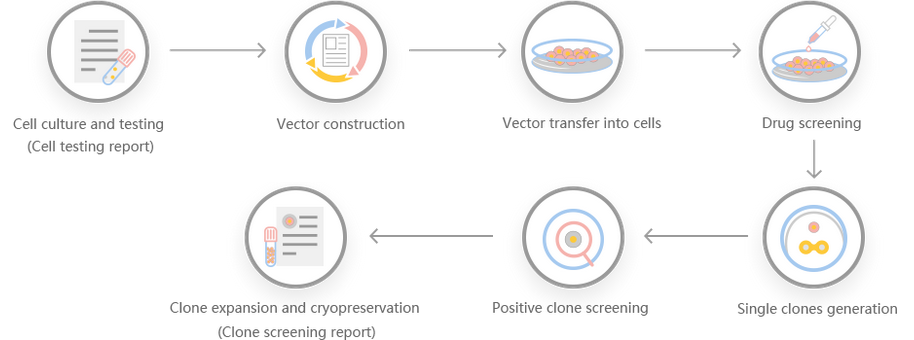CRISPR-U™ Gene Knockout Cell Line
Strategy
CHEK2 Gene Knockout Strategy
CRISPR-U™ technology (CRISPR based), developed by Ubigene, is more efficient than general
CRISPR/Cas9 technology in double-strand breaking and homologous recombination. With CRISPR-U™, Ubigene has
successfully edited over 3000 genes on more than 100 types of cell lines.
Objective
To create a Human CHEK2 Knockout
model in cell line by
CRISPR-U™-mediated
genome
engineering.
Target gene info 
| Official symbol | CHEK2 |
| Gene id | 11200 |
| Organism | Homo sapiens |
| Official full symbol | checkpoint kinase 2 |
| Gene type | protein-coding |
| Also known as | CDS1, CHK2, HuCds1, LFS2, PP1425, RAD53, hCds1 |
| Summary | In response to DNA damage and replication blocks, cell cycle progression is halted through the control of critical cell cycle regulators. The protein encoded by this gene is a cell cycle checkpoint regulator and putative tumor suppressor. It contains a forkhead-associated protein interaction domain essential for activation in response to DNA damage and is rapidly phosphorylated in response to replication blocks and DNA damage. When activated, the encoded protein is known to inhibit CDC25C phosphatase, preventing entry into mitosis, and has been shown to stabilize the tumor suppressor protein p53, leading to cell cycle arrest in G1. In addition, this protein interacts with and phosphorylates BRCA1, allowing BRCA1 to restore survival after DNA damage. Mutations in this gene have been linked with Li-Fraumeni syndrome, a highly penetrant familial cancer phenotype usually associated with inherited mutations in TP53. Also, mutations in this gene are thought to confer a predisposition to sarcomas, breast cancer, and brain tumors. This nuclear protein is a member of the CDS1 subfamily of serine/threonine protein kinases. Several transcript variants encoding different isoforms have been found for this gene. |
| Genomic regions | Chromosome 22 |
Strategy Summary
This gene has 15 protein coding transcripts:
| Name | Transcript ID | bp | Protein | Biotype | CCDS | UniProt Match | RefSeq Match | Flags |
| CHEK2-202 | ENST00000382580.6 | 1971 | 586aa | Protein coding | CCDS33629 | O96017-9 | - | TSL:1, GENCODE basic, |
| CHEK2-207 | ENST00000405598.5 | 1959 | 543aa | Protein coding | CCDS13843 | O96017-1 | - | TSL:5, GENCODE basic, APPRIS P1, |
| CHEK2-225 | ENST00000650281.1 | 1923 | 543aa | Protein coding | CCDS13843 | O96017-1 | - | GENCODE basic, APPRIS P1, |
| CHEK2-206 | ENST00000404276.6 | 1844 | 543aa | Protein coding | CCDS13843 | O96017-1 | NM_007194.4 | TSL:1, GENCODE basic, APPRIS P1, MANE Select v0.92, |
| CHEK2-201 | ENST00000348295.7 | 1771 | 514aa | Protein coding | CCDS13844 | O96017-12 | - | TSL:5, GENCODE basic, |
| CHEK2-204 | ENST00000402731.6 | 1591 | 476aa | Protein coding | - | O96017-12 | - | TSL:1, GENCODE basic, |
| CHEK2-210 | ENST00000425190.7 | 1510 | 322aa | Protein coding | - | B7ZBF2 | - | TSL:5, GENCODE basic, |
| CHEK2-205 | ENST00000403642.5 | 1359 | 452aa | Protein coding | - | O96017-4 | - | TSL:1, GENCODE basic, |
| CHEK2-223 | ENST00000649563.1 | 1224 | 322aa | Protein coding | - | O96017-13 | - | GENCODE basic, |
| CHEK2-219 | ENST00000464581.6 | 1138 | 323aa | Protein coding | - | A0A087X102 | - | TSL:2, GENCODE basic, |
| CHEK2-213 | ENST00000434810.5 | 984 | 276aa | Protein coding | - | H0Y820 | - | CDS 5' incomplete, TSL:3, |
| CHEK2-214 | ENST00000439200.5 | 906 | 295aa | Protein coding | - | B7ZBF7 | - | CDS 3' incomplete, TSL:5, |
| CHEK2-203 | ENST00000398017.3 | 713 | 162aa | Protein coding | - | B7ZBF8 | - | CDS 3' incomplete, TSL:5, |
| CHEK2-218 | ENST00000456369.5 | 588 | 144aa | Protein coding | - | H0Y4V6 | - | CDS 5' incomplete, TSL:3, |
| CHEK2-224 | ENST00000650233.1 | 573 | 176aa | Protein coding | - | A0A3B3ITA7 | - | CDS 3' incomplete, |
| CHEK2-208 | ENST00000416671.5 | 2560 | 207aa | Nonsense mediated decay | - | C9JFD7 | - | TSL:1, |
| CHEK2-212 | ENST00000433728.5 | 1580 | 289aa | Nonsense mediated decay | - | O96017-8 | - | TSL:2, |
| CHEK2-209 | ENST00000417588.5 | 1551 | 203aa | Nonsense mediated decay | - | O96017-5 | - | TSL:2, |
| CHEK2-216 | ENST00000448511.5 | 1532 | 165aa | Nonsense mediated decay | - | O96017-6 | - | TSL:2, |
| CHEK2-211 | ENST00000433028.6 | 1349 | 161aa | Nonsense mediated decay | - | F8WCV2 | - | TSL:5, |
| CHEK2-217 | ENST00000454252.1 | 722 | 45aa | Nonsense mediated decay | - | H7BZ30 | - | CDS 5' incomplete, TSL:3, |
| CHEK2-215 | ENST00000439346.5 | 553 | 57aa | Nonsense mediated decay | - | H7C0V7 | - | CDS 5' incomplete, TSL:4, |
| CHEK2-222 | ENST00000648295.1 | 1337 | No protein | Processed transcript | - | - | - | - |
| CHEK2-221 | ENST00000491919.5 | 609 | No protein | Retained intron | - | - | - | TSL:3, |
| CHEK2-220 | ENST00000472807.1 | 514 | No protein | Retained intron | - | - | - | TSL:2, |




Red Cotton™ Assessment
Project Difficulty Level unknown
| Target Gene | CHEK2 |
| This KO Strategy | loading |
| Red Cotton™ Notes | Gene CHEK2 had been KO in hela cell line. |
Aforementioned information comes from Ubigene database. Different origin of cell lines may have
different condition. Ubigene reserved all the right for final explanation.
Special deals for this gene:
$49
Single gRNA plasmid off-shelf
$599
Single gRNA lentivirus



Work flow







 Comment:
Comment: